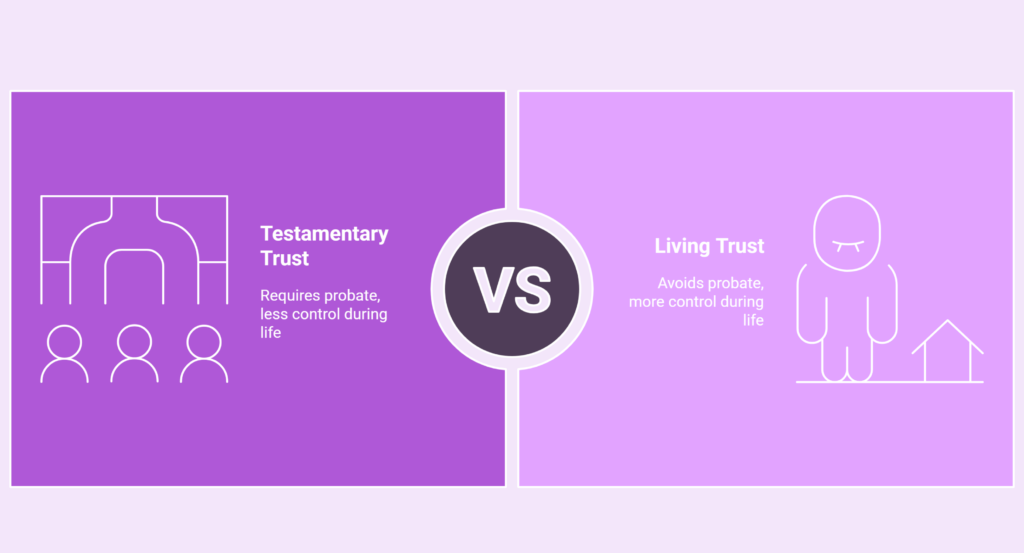When it comes to safeguarding your assets and planning for how they’ll be distributed after your death, trusts are one of the most powerful tools in estate planning. Two of the most common types—testamentary trusts and living trusts—are frequently used to manage wealth, protect beneficiaries, and reduce legal complications. However, they operate in fundamentally different ways, especially in the context of probate.
At Peabody Law Firm, we help families across Southlake, Westlake, Trophy Club, Colleyville, Keller, and surrounding areas understand which type of trust best fits their estate goals. If you’re weighing your options, here’s a clear breakdown of how testamentary trusts and living trusts differ—and how those differences can impact your estate.
Understanding the Basics
Let’s start with what each trust is and how it works.
Testamentary Trust
- Created through a will
- Activated only after the death of the person who created the will (the testator)
- Requires the estate to go through probate before the trust becomes active
- Used to manage assets for beneficiaries over time (e.g., minor children or individuals with special needs)
Living Trust (Revocable Living Trust)
- Created during your lifetime
- Can be managed and updated while you’re alive
- Assets placed in the trust are typically not subject to probate
- Used to streamline asset transfer, provide privacy, and offer flexibility
Both trusts can help achieve similar goals—such as controlling how and when beneficiaries receive inheritance—but the route each takes to get there is very different.
Probate and Activation
One of the most significant differences between these two types of trusts lies in how they’re activated and whether they involve the probate process.
Testamentary Trusts Go Through Probate
Because a testamentary trust is built into a will, it cannot take effect until the will goes through probate. This means:
- A court will oversee the validation of the will and the formation of the trust.
- There will be delays before the trust becomes functional.
- The estate and trust terms become a matter of public record, which may be a concern for families seeking privacy.
Living Trusts Avoid Probate
Living trusts are established while you’re alive and funded with your assets before death. When you pass away:
- The trust becomes irrevocable, and the successor trustee can immediately begin managing and distributing assets.
- No probate is required for the assets titled in the trust.
- The entire process is private, with no need for court intervention in most cases.
Control During Lifetime
Another key distinction involves your ability to control and manage the trust during your life.
Living Trusts Offer Ongoing Control
With a revocable living trust, you (the grantor) can:
- Serve as the trustee while you’re alive and competent
- Add or remove assets
- Update terms, beneficiaries, or distributions
- Revoke the trust entirely if your circumstances change
This flexibility is ideal for people who want to retain control over their estate but also ensure that their heirs avoid the complications of probate.
Testamentary Trusts Provide No Lifetime Control
Since testamentary trusts do not exist until after death, you cannot manage or test the structure in advance. That also means:
- You cannot avoid probate for the assets in your estate.
- There is no way to “see the trust in action” while you’re alive.
- Any updates require changes to your will, which may involve additional legal steps.
Costs and Complexity

Both trusts come with setup and administration costs, but their complexity varies.
Testamentary Trusts
- Often more affordable to set up initially (as part of a will)
- However, because they require probate and court oversight, the overall cost may be higher in the long run
- Ongoing court involvement can increase administrative burden and legal fees
Living Trusts
- Typically cost more to set up because of the initial work involved in creating and funding the trust
- However, because they avoid probate and are easier to manage after death, they can reduce costs and time for your heirs
Privacy and Efficiency
In today’s world, privacy matters—and the type of trust you choose can affect how much of your estate becomes public.
Living Trusts Keep Things Private
Since they don’t go through probate, your trust assets and terms remain confidential. Only your named trustee and beneficiaries need to be involved.
Testamentary Trusts Are Part of the Public Record
Because they’re created through a will, the terms of the trust are filed with the probate court and can become public information.
Choosing the Right Trust for Your Estate
So, how do you decide which type of trust is right for you?
You might consider a testamentary trust if:
- You’re only concerned about distributing assets to minor children or specific heirs in the future
- You have a small or simple estate and don’t mind the probate process
- You prefer to keep upfront legal costs minimal
A living trust might be a better fit if:
- You want to avoid probate and streamline asset transfer
- Privacy is important to you or your family
- You have multiple properties, business interests, or complex finances
- You’d like to maintain control of your estate while you’re alive but ensure efficient management after you’re gone
Often, the best estate plans include a combination of strategies, such as a revocable living trust paired with a will (including a “pour-over” clause) and other planning tools like powers of attorney and healthcare directives.
Final Thoughts: Strategic Planning Starts Now
Understanding the differences between testamentary and living trusts helps you make informed choices about your legacy. Each trust serves a specific purpose, and the right solution depends on your unique goals, family dynamics, and financial picture.
At Peabody Law Firm, we help individuals and families throughout Southlake, Westlake, Trophy Club, Colleyville, Keller, and neighboring areas craft estate plans that are thoughtful, effective, and aligned with their vision for the future.
Whether you’re looking to minimize court involvement or protect young beneficiaries, we’re here to help you make the right moves today to secure tomorrow.
Contact Peabody Law Firm today to schedule a consultation and discover how a tailored estate plan can benefit your family and your legacy.
Legal Disclaimer
This article is for educational purposes only and does not constitute official legal or financial advice. Estate planning laws are complex and subject to change. Individuals should consult with a licensed estate planning attorney to determine the best strategies for their unique situation.

